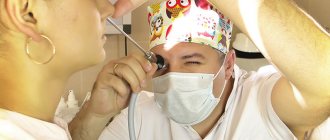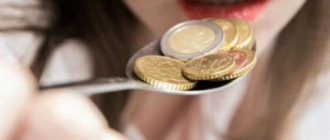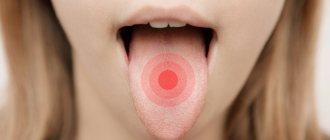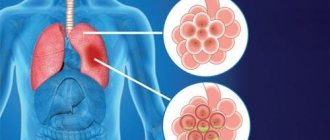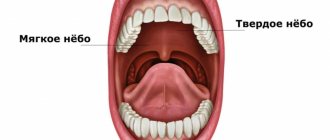Bad breath: physiology or disease?
Bad breath
in medical language it is called
halitosis
. There are physiological and pathological halitosis. Bad breath often appears in the morning. During the night, bacteria and their metabolic products accumulate in the mouth, which causes a bad odor. This type of halitosis is physiological and can be eliminated by simply brushing your teeth. Physiological halitosis also includes odor caused by eating a number of foods, such as garlic, onions, cabbage. This smell will disappear on its own as soon as the substances that caused it are eliminated from the body. But it also happens that an unpleasant odor is not eliminated using hygiene procedures; in this case, most likely, it is of a pathological nature.
Heartburn in children
In addition to problems with the digestive tract and dietary errors, heartburn in children can be caused by completely non-trivial reasons:
- neurological pathology,
- scoliosis,
- cystic fibrosis,
- ENT pathology,
- lung diseases.
In most children, heartburn is not as severe as in adults. However, unpleasant sensations cause discomfort to babies. Infants arch their backs, often burp, release gases and are capricious. At the same time, even with the slightest nutritional disorder in children, pain comes to the fore. Even slight bloating causes regularly recurring attacks of intestinal colic, and heartburn often leads to vomiting and refusal to eat. This can lead to insufficient weight gain, and uncontrollable vomiting quickly leads to dehydration.
Tips for parents for heartburn in children
- After feeding, the baby should be held upright for a while.
- If you have heartburn, first of all you should analyze your diet and diet, exclude all foods that cause heartburn (including limiting carbohydrates).
- Don't delay visiting the pediatrician. Against the background of prolonged heartburn and indigestion, anemia, apnea, and wheezing in the lungs may develop.
Important! It is necessary to exclude congenital anomalies of the digestive sphincter, intolerance to milk proteins and celiac disease.
Bad breath: causes
The most common cause of unpleasant odor is the active activity of pathological bacteria in the oral cavity. Diseases such as caries, periodontitis, pulpitis, periodontitis, gingivitis, stomatitis, as well as the formation of tartar can lead to persistent bad breath.
The second place among the causes of unpleasant odor is dry mouth (the medical term is xerostomia
). Mica, which moisturizes our mouth, has bactericidal properties. It kills bacteria, neutralizes their waste products, rinses and cleanses the oral cavity. If there is not enough saliva produced, bacteria are activated, resulting in an odor. Dry mouth can be a consequence of illness or taking a number of medications. It can also be caused by age: over time, the salivary glands begin to work less intensively, the composition of saliva changes, and its antibacterial properties are lost.
The smell can also be caused by ENT diseases: sore throat, chronic tonsillitis, sinusitis, runny nose.
Another cause of unpleasant odor is diseases of the internal organs. It can be:
- renal failure;
- liver failure;
- gastric diseases (gastritis, stomach ulcer);
- lung diseases.
Smoking is also a cause of persistent bad breath. The smell is caused by substances contained in tobacco smoke and deposited in the oral cavity. The only way to eliminate the unpleasant odor in this case is to quit smoking.
Solution
The basis of therapy for bad breath due to the stomach is, first of all, the correction of diet and nutrition. So, to treat the stomach, exclude foods that irritate the mucous membrane (onions, garlic, etc.) from the daily menu, give up alcohol and smoking, normalize the drinking regime (2–2.5 l), completely (or at least partially) exclude fried foods , fatty and other “heavy” dishes.
This therapeutic measure is complemented by sanitation of the oral cavity and, if necessary, hygienic cleaning in the dental office (many gastric diseases cause excessive accumulation of bacterial plaque on the tongue and gums, which in itself is the cause of halitosis). Complex treatment of abnormal processes in the stomach includes taking enterosorbents, anti-inflammatory drugs, enzymes, and, if necessary, antibacterial agents.
Gastritis - inflammation of the gastric mucosa - is the most common “provocateur” of rotten breath
The list of medications prescribed for gastric halitosis may include:
- Almagel (removes toxins and waste, prescribed for high acidity, relieves abdominal pain).
- Omeprazole (improves intestinal motility).
- Pancreatin (Festal) – pancreatic enzymes necessary for high-quality digestion of food.
- Ursosan (normalizes the acid-base balance of gastric juice).
- Amoxicillin (broad-spectrum antibacterial drug).
Folk remedies
Auxiliary therapy for gastric halitosis may consist of taking an infusion of sage and chamomile (1 tablespoon of dry herbs/glass of water). This medicinal composition is drunk orally or used for medicinal rinses (every 3 hours + after each meal). The infusion of strawberry leaves also normalizes the functioning of the stomach. Prepare it as follows: 1 tbsp. l. vegetable raw materials are steamed with a glass of boiling water and left for 30 minutes under the lid. The strained product is used to rinse the mouth.
Important! Seeds of dill, fennel, and parsley not only have a positive effect on digestion, but also help remove foul odor from the mouth. It is recommended to chew them 2-3 times a day.
For gastritis, ulcers, enzyme deficiency, dysbacteriosis, acid reflux and other digestive diseases, you should pay attention to flaxseed. So, every morning you need to steam 3 tbsp. l. of this product with a glass of boiling water. Drink the finished medicine ½ glass twice a day half an hour before meals.
St. John's wort is a medicinal plant with anti-inflammatory and antiseptic properties. Decoctions and infusions based on it not only have a positive effect on the functioning of the stomach, but also help prevent various dental problems. To combat halitosis, it is recommended to replenish your home medicine cabinet with the following medicinal herbs:
- oak bark;
- calendula flowers;
- calamus root;
- eucalyptus.
Another useful recipe for halitosis:
- 300 ml boiled water;
- 1 tsp each cinnamon powder, cloves, chopped peppermint;
- 2 tsp. finely chopped parsley.
How to prepare the medicine: put a pan of water on the fire, bring to a boil, add dry ingredients, simmer over low heat for 5 minutes. After this, the mixture is removed from the stove, filtered, cooled, and stored in the refrigerator. Use mouthwash every time you need to freshen your breath.
Only comprehensive instrumental and laboratory diagnostics can reveal the true causes of foul odor from the mouth.
It is useful to rinse your mouth with an aqueous solution of apple cider vinegar (1:1), the procedure is carried out no longer than 1-2 minutes/time. The use of any folk remedies for terrible putrid breath in stomach diseases is recommended to be discussed with your doctor.
What is bad breath like?
Peculiarities of odor can indirectly indicate the source of problems.
Hydrogen sulfide smell
(the smell of rotten eggs) indicates rotting protein substances. This smell is typical for digestive problems. A persistent hydrogen sulfide odor may indicate gastritis with low acidity or a stomach ulcer.
Sourish smell
and a corresponding taste in the mouth is noted with gastritis with high acidity. This smell may appear at an early stage of the disease, when other symptoms are not yet present.
Bitter smell
and the taste in the mouth is typical of liver and gallbladder diseases. An additional symptom is the appearance of a yellow coating on the tongue.
Smell of acetone
and the accompanying sweet taste in the mouth is a characteristic symptom of diabetes.
Urine smell
from the mouth indicates a disease of the genitourinary system (primarily the kidneys or bladder).
Stool smell
from the mouth can occur due to intestinal diseases (dysbacteriosis, intestinal dyskinesia, intestinal obstruction).
Putrefactive
bad breath is typical for dental diseases (inflammatory processes of teeth and gums).
Which doctor should I contact?
If an unpleasant odor appears, the first step should be a visit to the dentist. This doctor will be able to help in the vast majority of cases. If no problem is detected, it is the turn of a nutritionist and gastroenterologist. Most likely, in this case, you will have to take additional blood and urine tests. Depending on the results obtained, a specific specialist will treat the problem: for problems with the thyroid gland - an endocrinologist, for kidney diseases - a urologist, for pathologies of the respiratory system - an ENT specialist or a pulmonologist.
You can get rid of an unpleasant odor only by establishing an accurate diagnosis. Therefore, if the problem persists longer than 2-3 days, it’s time to start an examination!
Author: Elena Kopylova Dentist-therapist, endodontist. Work experience more than 8 years.
The information is for reference only. Before treatment, consultation with a doctor is necessary.
Bad breath: what to do?
The fight against bad breath begins with careful adherence to good oral hygiene. If the source of the odor is bacterial activity, proper brushing of your teeth will help. Teeth should be brushed not only from the outside, but also from the inside, and also treat the chewing surface of the teeth. The brush angle should be 45°. Using dental floss, hard-to-reach areas between teeth are treated. If your teeth are in poor condition, simply brushing your teeth will not solve the problem. You will need to visit a dentist and remove tartar, and if your teeth have caries, cure them. It is recommended to visit the dentist at least once or twice a year.
It is also necessary to combat dryness of the oral mucosa. If you feel dry mouth, take a few sips of water and rinse your mouth. However, it should be remembered that frequent dry mouth can be a symptom of serious diseases. However, like the unpleasant smell itself. Therefore, if you have persistent bad breath, you should definitely see a doctor and undergo an examination.
Heartburn due to coronavirus
With COVID-19, painful gastrointestinal symptoms, including heartburn, are caused by several factors.
- The coronavirus enters the gastrointestinal tract and provokes functional changes.
- Patients experience significant stress during their illness.
- With COVID-19, chronic diseases often worsen, and in our country up to 85% have problems with the gastrointestinal tract.
- Due to the frequent gastrointestinal symptoms, the “delta” strain of coronavirus has already been called “stomach covid.”
Important! Heartburn with coronavirus, especially in combination with severe weakness, increasing shortness of breath and worsening cough, may indicate a severe course of the disease.
Recent studies have shown that over the next year, patients who have recovered from COVID-19 have a significantly increased risk of developing diabetes mellitus, autoimmune gastrointestinal diseases and psychosomatic disorders, including gastric ulcers. Therefore, if heartburn occurs, patients recovered from coronavirus should visit a gastroenterologist.
Important! Information has appeared in the press that the heartburn drug Famotidine improves the well-being of patients with coronavirus. However, only 10 people participated in the study, and therefore it is premature to talk about the effectiveness of this drug and its safety against COVID-19. We strongly advise against taking Famotidine on your own without a doctor’s prescription.
It is important to know
It is worth remembering that any symptoms go away only after complete relief from the disease. If you do not start treating the disease itself, complications may appear that will cause more serious problems. All diseases associated with the stomach require examination and individual treatment. Only a doctor can prescribe the correct treatment.
All the methods described above are quite effective, but it is worth considering that they may not be suitable for everyone. In addition, there are different stages of the disease that require a special approach. A proper and nutritious diet can bring many benefits.
If you use advice on what to refuse and what to pay attention to, the treatment will be much more effective. By combining useful information, you can find the fastest and most enjoyable treatment method. Do not forget about walks in the fresh air, which have a very beneficial effect on the digestive processes.
Traditional methods
Cabbage juice will help cure gastritis.
You can use traditional methods, which are quite effective. But when using them, it is important to follow the dosage recommendations.
An important factor is also that any medicinal plant has its contraindications.
For these procedures to be beneficial, you need to study information about the medicinal plant. If the disease is gastritis, you can use the following methods:
When to go to a gastroenterologist?!
— Elena Evgenievna, what complaints do patients most often come with?
— The most common: abdominal pain and heartburn. There are many causes of abdominal pain: from functional disorders due to stress to serious illnesses.
Often there is pain in the right hypochondrium due to dysfunction of the biliary tract, and a feeling of discomfort in the epigastric region due to gastritis. In spring and autumn, peptic ulcer disease often worsens. The situation may worsen due to stress and dietary errors. Moreover, as a rule, these two factors are interrelated: a stressful state for many is a trigger for eating disorders: someone’s appetite increases or, conversely, disappears, and the person eats irregularly or overeats, reduces control over the quality of food, etc. All this inevitably leads to problems with the gastrointestinal tract.
Heartburn is not a separate disease, but a symptom: a burning sensation behind the sternum. In fact, this is a chemical burn from the acidic contents of the stomach when it is thrown into the esophagus, where the environment is often alkaline. This leads to damage to the esophageal mucosa by hydrochloric acid and the protein-breaking enzyme pepsin. Sometimes with reflux disease there is no heartburn, but there is a feeling of a lump in the throat, difficulty swallowing, pain in the chest, which is confused with angina. All this significantly reduces the patient’s quality of life. This disease can and should be treated. Frequent reflux of acid from the stomach into the esophagus, especially with an admixture of bile from the duodenum, can even lead to cancer of the esophagus. Treatment is usually long-term, since the situation has developed over the years, and it cannot be changed instantly. In addition to medication, changes in lifestyle and eating habits are required. With the help of medications, we can reduce the amount of acid produced, which will lead to less of it being thrown into the esophagus, and accordingly, heartburn will appear less. There are also a number of drugs that absorb acid and remove it. These are quick-acting remedies. They help get rid of heartburn for 30–40 minutes. Typically, these are the drugs that are actively promoted in advertising and will be offered by the pharmacist at the pharmacy. The patient must, of course, follow the doctor’s recommendations.
Meals during reflux disease should be in small portions so that the volume of food eaten does not exceed the volume of the stomach, and for better control of appetite, frequent portions: 4-5 times a day. Food must be chewed thoroughly to break it down as much as possible and release more saliva, which, having an alkaline reaction, neutralizes the acid.
For reflux disease, boiled, baked, stewed vegetables, liquid porridges, pasta, lean meats, poultry, seafood, eggs, cottage cheese, stale bread and crackers, jellies, mousses, jelly, puree soups, and dairy products are recommended. They increase acid formation in the stomach and therefore are not recommended: smoked foods, fatty, spicy, salty foods, mushrooms, raw vegetables, sour fruits and juices, carbonated drinks, brown bread, baked goods, fast food, strong tea and coffee
— Does heartburn result from poor nutrition or is its occurrence genetically determined?
- Both. The peculiarity of the sphincters between the esophagus and stomach is genetically determined. A fairly common problem is connective tissue dysplasia, that is, its increased elasticity, which results in flat feet, varicose veins, “unstable vertebrae,” and weakness of many sphincters, including the esophagogastric and esophageal opening of the diaphragm. That is, they do not close tightly enough, and food easily passes from the esophagus into the stomach.
The number of parietal cells in the stomach is also genetically determined, which determines the quantity and quality of hydrochloric acid they produce. Heartburn in pregnant women
Pregnant women often complain of heartburn. This is due to two main points. Firstly, as the baby grows and the uterus enlarges, intra-abdominal pressure increases, the load on the stomach and intestines increases, which can provoke the reflux of acid and bile into the esophagus. By the way, this often leads to constipation in pregnant women. Secondly, pregnant women have a special hormonal background aimed at reducing the tone of the uterus and, at the same time, the sphincters of the esophagus relax, which can result in acid reflux. If you have similar problems, you don’t have to endure and wait that “it will go away on its own after childbirth”... Contact a gastroenterologist right away. The doctor will select treatment: there are drugs approved for use during pregnancy. Also, together with a gastroenterologist, you will discuss how to change your diet and lifestyle in order to get rid of this problem. Ideally, contact a gastroenterologist at the stage of pregnancy planning - this way you can avoid many problems with the gastrointestinal tract that arise during this period in a woman’s life.
— One of the very common diagnoses is gastritis. What is the reason for this and how is it treated?
— Gastritis is an inflammation of the gastric mucosa. This diagnosis is, indeed, very often made, and often without proper grounds. This diagnosis is made morphologically, that is, after a morphologist describes the existing inflammatory changes as a result of a biopsy of the gastric mucosa. Then it’s gastritis. Only on the basis of complaints, a competent doctor can write only “functional dyspepsia syndrome” in the diagnosis. Complaints with gastritis are quite varied: it can be pain, a feeling of a full stomach even with a small amount eaten, belching, vomiting, etc. This depends on the characteristics of the production of gastric juice, on the vegetative status of the patient, on the characteristics of his lifestyle, eating pattern - everything is very individually.
Myth
Probably everyone has heard the opinion: “if you eat dry food, you will get gastritis.” In fact, this is not true! Food should be without additional liquid; it should not be washed down with water, tea, coffee, etc. Liquid dilutes the acidic contents in the stomach and impairs the quality of food digestion. But eating “on the run” is really not worth it - the most important thing for a good digestion process is chewing food thoroughly! A large amount of saliva released during chewing is necessary for the absorption of food. What causes gastritis? Stress, systematic violation of the diet, violation of the frequency of meals, abuse of semi-finished products, concentrates, spices, sour, hot, peppery, salty, smoked, fried, too hot, too cold or otherwise thermally, chemically or mechanically irritating foods, carbonated drinks, coffee , alcohol, smoking; lack of thorough chewing of food.
In addition, gastritis is often caused by the bacterium Helicobacter pylori. This bacterium needs acid-free conditions to exist; for this, it “envelops” itself in a cloud of urease, an enzyme that creates an alkaline environment. All this damages the mucous membrane to the point of its atrophy, and can also lead to the development of stomach and duodenal ulcers, significantly increasing the risk of developing stomach cancer. 95% of gastric ulcers and 85% of duodenal ulcers worldwide are associated with Helicobacter pylori infection. Other causes of damage to the gastric and duodenal mucosa are frequent use of non-steroidal anti-inflammatory drugs. In the treatment of gastritis and peptic ulcers, drugs are used that reduce the acid production of the gastric mucosa and improve its healing, and if Helicobacter pylori is detected, a course of antibacterial therapy is used. The patient must be prescribed a gentle diet. All these measures are prescribed only by a doctor. Self-medication can be not only ineffective, but also harmful to the patient.
— Is stress also one of the reasons for the development of irritable bowel syndrome (IBS)?
— Yes, the classic triad for making this diagnosis: stress, pain, bowel dysfunction (diarrhea, constipation or their alternation). The very name of the disease contains its essence: the intestine is irritated, sensitivity is increased.
The unusual thing about this disease is that the patient has no visible damage to the intestinal mucosa. No examination can establish what is actually happening to the human body, but the disease clearly manifests itself. The mechanism of symptoms is related to the characteristics of the intestines. The intestine has its own nervous system, which is part of the autonomic nervous system. In stressful situations, the entire nervous system of the body begins to malfunction; the brain gives incorrect signals to the intestines, which incorrectly inform the brain about the processes occurring in it. As a result, intestinal motility is disrupted, the pain sensitivity threshold is reduced, and even minor discomfort causes severe attacks of pain.
In addition to stress and a low pain threshold, the risk of developing IBS is increased by poor diet, sedentary lifestyle, hormonal imbalances (for example, in pregnant women), and genetic predisposition. IBS can also develop after certain infectious bowel diseases. The main difficulty in IBS is that the symptoms are very unpleasant, and correction must be carried out, first of all, on the psycho-emotional state, which is quite difficult without the help of a competent psychologist. At the same time, there is still a problem that often patients do not even admit to themselves that they need psychological help. When making this diagnosis, it is very important to be oncologically alert. However, in our time this is always important, even in young patients, but especially in older people. IBS appears more often in young people, so if similar symptoms are observed in mature patients, the doctor must first rule out cancer.
— During antibiotic therapy, doctors often advise taking probiotics or prebiotics. Is this really necessary?
— Antibiotics affect the intestinal flora, this is indisputable. Often, against the background of antibacterial therapy, a patient develops dysbiosis (“dysbacteriosis”), that is, a qualitative and/or quantitative change in the ratio of microorganisms that live in the intestines. Dysbiosis is manifested by stool disturbances, flatulence (excessive gas formation), and the presence of inflammation on the mucous membrane. To prevent the development of this unpleasant condition, it is recommended to take pro- and prebiotics. Probiotics are medications or biologically active food additives that contain live microorganisms that are representatives of the normal human microflora. They are designed to restore the disturbed balance of microorganisms inhabiting various human mucous membranes, and therefore are used for the treatment and prevention of immunodeficiency, dysbiosis and related diseases. Probiotics stimulate the immune system at all levels, which has been proven in numerous clinical studies.
Prebiotics
- These are food ingredients that are not digested by human enzymes and are not absorbed in the upper sections of the gastrointestinal tract. They stimulate the growth and vital activity of beneficial microflora: breaking down into fatty acids, they increase acidity in the colon, inhibiting the growth of opportunistic microflora, which also creates favorable conditions for the development of normal microflora. Prebiotics are found in dairy products, corn flakes, cereals, bread, onions, chicory, garlic, beans, peas, artichokes, asparagus, bananas and many other foods. They also exist in the form of dietary supplements.
There is an opinion that probiotics in tablet and liquid forms are less effective, since they cannot always pass through the highly acidic environment of the stomach, where bile is aggressive to bacteria. And only capsules are designed to dissolve in the colon - where bacteria should live. Not so long ago, symbiotics appeared on the market - combination drugs that combine pre- and probiotics. Today they are considered to have the most advanced mechanism of action. I recommend choosing drugs that normalize the microflora together with your doctor - because it is quite difficult for a non-specialist to understand all the variety of existing drugs, and it is unlikely that you will be able to understand what is suitable in each specific case on your own.
— Why are constipation dangerous?
— Constipation is a condition characterized not only by a decrease in the frequency of bowel movements: less than 3 times a week, but also by the appearance of dense, dry stool or the absence of a feeling of complete bowel movement or bowel movement with straining or the use of additional techniques by patients to empty the bowel. Long-term constipation causes: chronic intoxication (poisoning), which leads to sleep disturbances, unmotivated fatigue, increased fatigue and, finally, to depression, deterioration of the skin and hair; the formation of intestinal diverticula (protrusions of the wall), which can cause abdominal pain, and if an infection occurs, inflammation of the intestinal mucosa (diverticulitis) and the need for intensive antibacterial therapy or surgical treatment if intestinal obstruction occurs; varicose hemorrhoidal veins, chronic anal fissures; colon cancer. You need to start solving the problem of constipation not with self-medication, but with a visit to a gastroenterologist. There are many reasons for constipation. These can be very serious diseases. Only a competent specialist can understand this. By solving the problem of constipation on your own, you can significantly worsen your condition.
— Is such a delicate problem as flatulence treated?
— Flatulence (increased gas formation) is associated with fermentation. There can be many reasons: insufficient bile secretion, insufficiently concentrated bile, disturbances in the secretion of pancreatic juice - usually problems with the sphincter of Oddi. All this leads to changes in the bacterial flora of the intestines. As a result, flatulence develops. This is a common problem, but it can be solved. Although I won’t say that it’s always simple and fast. The main thing is to find the root cause, since flatulence can be a symptom of various diseases.
— Sometimes a person suffers from bad breath or an unpleasant taste in the mouth. Is this a symptom of some disease?
- Halitosis - bad breath - can occur for various reasons. First of all, I would recommend visiting a dentist and checking the condition of your teeth and oral cavity. In second place are ENT diseases. If everything is in order in these areas, then, indeed, halitosis may be a consequence of digestive problems. As for the taste in the mouth, this can be a symptom of certain diseases. But here everything is very individual: the taste can be sweet, bitter, sour, metallic, etc. It can be constant or appear only after eating or, conversely, on an empty stomach, etc. Therefore, you need to look and look for the reason.
— Often, patients who have undergone an ultrasound of the abdominal organs find out that they have a kink in the gallbladder - how serious is this?
— Deformations of the gallbladder - kinks, membranes, etc. increase the risk of bile stagnation. The gallbladder should normally empty almost completely after each meal. Because the gallbladder has to work harder to contract, some patients may experience pain. After its reduction, part of the bile may remain behind the bend and “stagnate,” which can lead to the formation of stones. I recommend that patients with gallbladder deformation monitor their condition: see a doctor, do an ultrasound of the abdominal organs once a year to see the condition of the bile and gallbladder. If an ultrasound diagnostic doctor notes that the bile is “viscous,” “heterogeneous,” “inhomogeneous,” etc., it is important to immediately contact a gastroenterologist and undergo a course of therapy to prevent the formation of stones. It is especially important to take gallstone prevention seriously if anyone in your close family has these problems.
— What methods can be used to prevent gastrointestinal diseases? Maybe I need to take medications or have tubing done?
— You should not use any preventive medications without a doctor’s prescription. All medications have side effects and are not recommended to be taken unless indicated. To carry out tubage (a procedure that involves taking choleretic drugs to simultaneously empty the gallbladder), certain indications and contraindications are also required. More often, the doctor prescribes this procedure in combination with other therapeutic measures, selects medications, etc.
The best prevention of gastrointestinal diseases is proper nutrition: small portions, thoroughly chewing food to a pulp. You need to eat at least 4-5 times a day, be sure to have breakfast within an hour after a night's sleep. The volume of water drunk per day should be at least 1.5 liters.
Try to minimize the amount of food that provokes the development of diseases. We have already listed them above: fast food, pickles, smoked foods, fried, spicy, etc. Add physical activity: it has been proven that a sedentary lifestyle contributes to gastrointestinal problems, while abdominal exercises, brisk walking, and yoga have a beneficial effect on intestinal function. Organize your lifestyle in such a way as to maintain health for a long time - and you will protect your body from many unpleasant problems.
